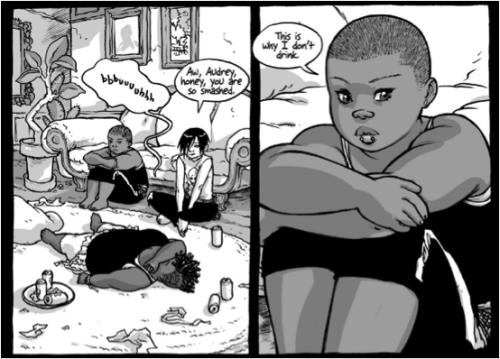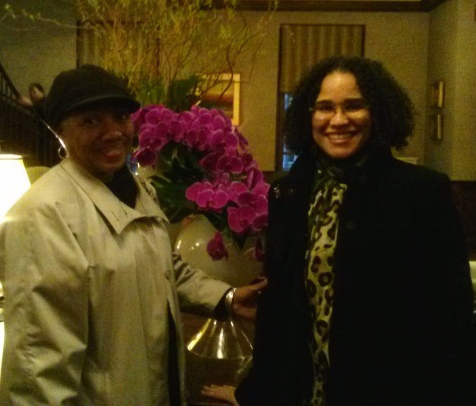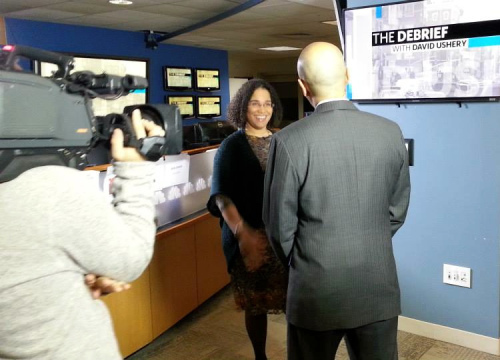Zetta Elliott's Blog, page 58
March 23, 2014
making room
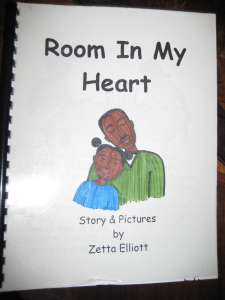 I started writing stories for children in 2000. I finished my first adult novel in 1999 but after months of promising responses from agents and editors, I accepted the fact that a six-figure advance wasn’t in my future. I started writing for kids and my earliest stories reflect where I was emotionally and professionally at that point in my life. I was trying to build healthier relationships with my family members and so I wrote “Room in My Heart,” a story about two sisters trying to adjust to the new woman in their father’s life. I showed it to my father and he threw it down, enraged. I made an illustrated version and showed it to the kids in the after-school program where I taught—they loved it! So I kept on writing and soon I had half a dozen stories. “The Phoenix on Barkley Street” about a group of kids who find a magical bird in the overgrown yard of an abandoned brownstone. “The Magic Mirror” about a girl who finds a mirror that shows her scenes of Black women’s heroism throughout history. I submitted them to numerous publishers and an editor at Lee & Low wrote me back, asking to meet for lunch. That’s how my friendship with Laura Atkins began, and she taught me a lot in those early days about how to format a story for the standard 32-page picture book. My stories were 6-8 thousand words long and so I learned how to tell a story in just 1500 words. Now I’m revisiting those long stories—they’re chapter books, really, and with some illustrations I think they’d really appeal to 7-10 year olds. I never thought I could self-publish an illustrated book because professional artists are very expensive. But my cousin suggested I look at Elance.com and now I’ve got FOUR books “in production.” Three will have black and white illustrations and one will be printed in full color. My goal is to keep prices low—$5 per book—but printing in color is pricey. That book will likely cost $10. I’ve been invited to participate in the Reginald F. Lewis Museum’s African American Children’s Book Fair in May and hope to have these books ready by then. Stay tuned…
I started writing stories for children in 2000. I finished my first adult novel in 1999 but after months of promising responses from agents and editors, I accepted the fact that a six-figure advance wasn’t in my future. I started writing for kids and my earliest stories reflect where I was emotionally and professionally at that point in my life. I was trying to build healthier relationships with my family members and so I wrote “Room in My Heart,” a story about two sisters trying to adjust to the new woman in their father’s life. I showed it to my father and he threw it down, enraged. I made an illustrated version and showed it to the kids in the after-school program where I taught—they loved it! So I kept on writing and soon I had half a dozen stories. “The Phoenix on Barkley Street” about a group of kids who find a magical bird in the overgrown yard of an abandoned brownstone. “The Magic Mirror” about a girl who finds a mirror that shows her scenes of Black women’s heroism throughout history. I submitted them to numerous publishers and an editor at Lee & Low wrote me back, asking to meet for lunch. That’s how my friendship with Laura Atkins began, and she taught me a lot in those early days about how to format a story for the standard 32-page picture book. My stories were 6-8 thousand words long and so I learned how to tell a story in just 1500 words. Now I’m revisiting those long stories—they’re chapter books, really, and with some illustrations I think they’d really appeal to 7-10 year olds. I never thought I could self-publish an illustrated book because professional artists are very expensive. But my cousin suggested I look at Elance.com and now I’ve got FOUR books “in production.” Three will have black and white illustrations and one will be printed in full color. My goal is to keep prices low—$5 per book—but printing in color is pricey. That book will likely cost $10. I’ve been invited to participate in the Reginald F. Lewis Museum’s African American Children’s Book Fair in May and hope to have these books ready by then. Stay tuned…


March 16, 2014
lost & found
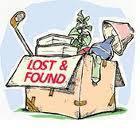 One good thing about having anxiety issues is that I almost never lose things. I check and double check my bag before I leave the house. I’ve never lost my keys or my wallet, but yesterday I lost my phone. It was a cheap Blackberry knock-off with a scratched screen; I’d had it for years but I was still surprised when I realized it was gone. Last fall my friend and I vowed we would catch up with technology and finally purchase a Smartphone. I decided to wait until winter break when I would have time to compare plans and models. Then suddenly it was March and I questioned whether I really needed a new phone—the old one still worked, I liked the easy-to-text keypad, and my monthly bill was under $30. But when I realized last night that my phone really was gone, I finally stopped making excuses and bought a Smartphone online. It’s the most basic kind—very few bells and whistles—but that’s all I need.
One good thing about having anxiety issues is that I almost never lose things. I check and double check my bag before I leave the house. I’ve never lost my keys or my wallet, but yesterday I lost my phone. It was a cheap Blackberry knock-off with a scratched screen; I’d had it for years but I was still surprised when I realized it was gone. Last fall my friend and I vowed we would catch up with technology and finally purchase a Smartphone. I decided to wait until winter break when I would have time to compare plans and models. Then suddenly it was March and I questioned whether I really needed a new phone—the old one still worked, I liked the easy-to-text keypad, and my monthly bill was under $30. But when I realized last night that my phone really was gone, I finally stopped making excuses and bought a Smartphone online. It’s the most basic kind—very few bells and whistles—but that’s all I need.
Living with anxiety is helpful sometimes—it keeps me vigilant but I realize it also prevents me from embracing change. I hate to shop and so I wear the same three items of clothing until they don’t fit any more. I hate the stress of searching for a new apartment and so I’ve put up with a less than stellar landlord and neighbors with yappy dogs. Sometimes it takes a crisis to knock me out of my comfort zone and guess what? The publishing industry is in crisis. I’m avoiding Facebook for a while because friends keep sending me links to two op-eds written for The New York Times by Walter Dean Myers and his son Christopher. Both pieces are well written but getting them over and over makes me feel the same irritation I experience when colleagues ask me to plan an event for Black History Month. I teach Black Studies all year round—I don’t need extra work for 28 days. Ask someone in the Math department! When it comes to diversity in publishing, I’ve spent the past 5 years blogging, and publishing articles, and presenting at conferences, and developing initiatives like The Birthday Party Pledge. Women generally have been doing this work for decades, but it takes a certain kind of privilege to find a platform like The Times. I’m glad the Myers are speaking out and I agree with everything they said. And maybe male voices will be heard in a way women’s voices have not.
This weekend I’ve been communicating with an artist in Honduras. I’m going through the 20+ manuscripts on my hard drive and selecting those I can publish on my own. Many of them are picture books, and unfortunately self-pubbing in color is prohibitively expensive. But some are chapter books that a 3rd grader would love, especially if I add a dozen black and white sketches. My goal is to have at least three $5 books ready by next fall. Why let these stories sit on my hard drive when kids are clamoring for books like mine? Imagine what First Book could do if instead of giving a million dollars to a corporate publisher like HarperCollins, they started their OWN press and bought manuscripts directly from authors of color. We need to stop waiting for the publishing industry to change. It’s racist to the core and not interested in serving our kids. Time to let go and find another way forward…


March 14, 2014
Yes, Comics Can Empower Black Girls!
I’m thrilled that comics scholar Qiana Whitted took the time to write this amazing guest post—enjoy and please share!
***
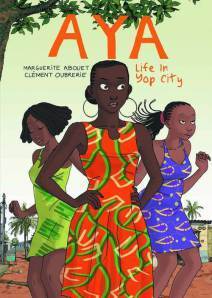 It is unlikely that anyone who reads comics regularly will be surprised by Zetta Elliott’s answer to the question posed in her January 6, 2014 post, “Do Comics Empower Black Girls?” She’s doubtful, and understandably so, given the hypersexualized objectification of women that dominates superhero comics. Nevertheless, comics can tell deeply rewarding, complex stories about black women that affirm their intelligence, compassion, strength, and beauty on multiple visual and verbal registers. So I come away from the question with a different response, not only as someone who studies race and comics, but also as a black girl who has found much to love in a comic book!
It is unlikely that anyone who reads comics regularly will be surprised by Zetta Elliott’s answer to the question posed in her January 6, 2014 post, “Do Comics Empower Black Girls?” She’s doubtful, and understandably so, given the hypersexualized objectification of women that dominates superhero comics. Nevertheless, comics can tell deeply rewarding, complex stories about black women that affirm their intelligence, compassion, strength, and beauty on multiple visual and verbal registers. So I come away from the question with a different response, not only as someone who studies race and comics, but also as a black girl who has found much to love in a comic book!
Let’s be clear, though, about the term “comics.” Critics often take issue with the depiction of women in superhero titles produced by Marvel (Disney) or DC Comics (Time Warner), but it’s a mistake to equate the superhero genre and its transmedia properties with the entire comics form. This isn’t to say that mainstream superhero comics completely ignore the lives of women of color or refuse to engage contentious social issues. Storm is one of the most well known heroines of any race to wear a cape and a Wakandan princess has held the title of Black Panther. The new Ms. Marvel is Kamala Khan, a Muslim Pakistani-American teenager from New Jersey.
Yet one need only look back at Don McGregor’s account of his exchange with Stan Lee over Marvel’s first interracial kiss – or more recently, “Batwomangate” – to get a sense of the effort required to take even small, measured risks in a mainstream superhero comic. But what about fantasy, romance, horror, slice-of-life, and adventure stories? What about small and independent presses or self-published titles? What about comics produced outside the United States?
The twenty titles discussed below are just a start, especially now that the comic book publishers are paying more attention to girls and young adult women as marketing demographics. And while not all the comics I cite are created by black women, events like the recent panel on “Black Women in Comics” at the Schomburg Center’s 2nd Annual Black Comic Book Day make clear that black women have long been a part of the industry as avid consumers and creators. The dynamic work of Afua Richardson and C. Spike Trotman, along with this list of over 50 black women comics artists and writers from the Jackie Ormes Society models the kind of creative freedom that can empower any girl who picks up a comic.
Black Women of the Golden and Silver Age
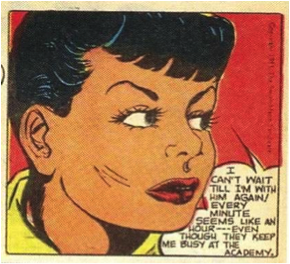 Speaking of Jackie Ormes, much credit is due the first African American woman cartoonist whose comic strips were published in black-owned newspapers such as the Pittsburgh Courier during the 1940 and 1950s. Her comic “Torchy in Heartbeats” follows a single African American woman named Torchy Brown (right) in romance serials that highlight both her sense of adventure and style. On the blog, Sequential Crush, comics scholar Jacque Nodell frequently posts scans of hard-to-find romance comics with black women like the one-shot Dell comic about a fashion photographer named Friday Foster, based on the syndicated comic strip and later turned into a film. Black women featured in their own series title are much harder to come by in the 1970s, but it’s not uncommon to find guest appearances by novelty characters like Wonder Woman’s black twin sister, Nubia or a black Spider Woman.
Speaking of Jackie Ormes, much credit is due the first African American woman cartoonist whose comic strips were published in black-owned newspapers such as the Pittsburgh Courier during the 1940 and 1950s. Her comic “Torchy in Heartbeats” follows a single African American woman named Torchy Brown (right) in romance serials that highlight both her sense of adventure and style. On the blog, Sequential Crush, comics scholar Jacque Nodell frequently posts scans of hard-to-find romance comics with black women like the one-shot Dell comic about a fashion photographer named Friday Foster, based on the syndicated comic strip and later turned into a film. Black women featured in their own series title are much harder to come by in the 1970s, but it’s not uncommon to find guest appearances by novelty characters like Wonder Woman’s black twin sister, Nubia or a black Spider Woman.
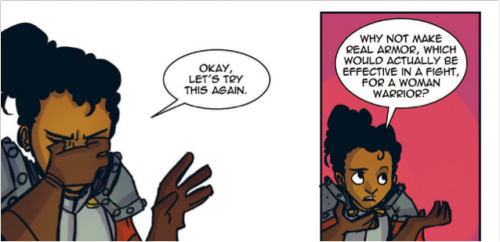
Questing Heroines and All-Ages Comics
For younger readers today, Princeless by Jeremy Whitley and M. Godwin is fantastic. At the center of the comic is a princess (above) with brown skin, thick tangled hair, and a great sense of humor who gets sick of waiting in the locked tower for a prince. She befriends the dragon, grabs a sword and armor, and decides to rescue herself and her sisters. (Side note: this is my 7-year-old daughter’s favorite comic!) Other titles with strong female protagonists that may appeal to black girls include Molly Danger by Jamal Ingle, Juan Castro, Romulo Farjardo, The Many Adventures of Miranda Mercuryby Brandon Thomas and Lee Ferguson, and Bayou by Jeremy Love (which I’ve written about here and here). And of course, even a list as short as this one should make room for ponies that empower, not to mention the characters and stories that girls create on their own.
Race, Sexuality, and Coming of Age
Jennifer Cruté is a self-published African American cartoonist whose reflects upon her own childhood and adolescence during the 1970s and 1980s in Jennifer’s Journal: The Life of a SubUrban Girl. Cruté takes an approach familiar to readers of The Boondocks in the way she uses cartoon images of herself and her family to explore mature issues. But as I’ve discussed here, her observations about race, sex, religion, and class push against limiting assumptions about the comics form in representing black women’s experiences.
Another incredible series is Wet Moon by Ross Campbell (above). The comic, as the intro to this review by Sarah Horrocks describes it, is about “variously gothic and geeky and gay girls (and some boys) attending art college in the American south.” While the story features at least two prominent African American characters, its frank considerations of body image and exploration of queer, racialized, and disabled bodies is a startling and rare pleasure. Challenging traditional gender roles is also critical to the French comic series, Aya, by Marguerite Abouet and Clement Oubrerie, which takes place during the 1970s in Cote d’Ivoire. The story unfolds like a soap opera among the young West African women and their families during their country’s unprecedented period of modern wealth and promise. Don’t miss the appendix in the two thick English-translated volumes with additional background on the clothing, food, and language among the Ivorians. An animated film version of Aya was even released in France in 2013.
Women of Action
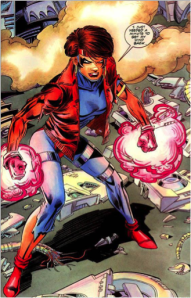 And finally, what about those superheroes? Looking back to the 1990s, the mini-series, Martha Washington, by Frank Miller and David Gibbons is a favorite of my friend Grace Gipson who is researching black comics and popular culture at UC Berkley. In her interview with Huffington Post, “Black, Female, and Superpowered,” she explains:
And finally, what about those superheroes? Looking back to the 1990s, the mini-series, Martha Washington, by Frank Miller and David Gibbons is a favorite of my friend Grace Gipson who is researching black comics and popular culture at UC Berkley. In her interview with Huffington Post, “Black, Female, and Superpowered,” she explains:
Visually, Washington challenges the typical comic book hero image. Martha Washington is not your classic privileged superhero — she actually humanizes the superhero experience by being a “regular” African-American woman who ultimately becomes a hero.
Writer Dwayne McDuffie had similar motives when he created a 15-year-old black female sidekick named Rocket for his signature superhero in the Milestone Comic, Icon. Despite Rocket’s secondary role, the voice of this teenage mother who wants to be a writer like Toni Morrison establishes the guiding vision for the comic as she learns how to negotiate her newly acquired powers with the social realities around her. (McDuffie also devoted more attention to the black superhero Vixen in his run on Justice League of America.)
Other women of action can be found in the multi-racial cast of Marvel’s Runaways; Dark Horse’s Concrete Park created by Erika Alexander, Tony Puryear, and Robert Alexander; independent comics like Ajala: A Series of Adventures by N. Steven Harris and Robert Garrett; and popular series where black women emerge as strong secondary characters like Michonne from The Walking Dead and Agent 355 in Y The Last Man.
Have you read any of these comics? Know of others that I’ve overlooked? Please share titles and links in the comments. And a very special thanks to John Jennings, Grace Gipson, Julian Chambliss, Ebony Elizabeth Thomas, and Breshaun Joyner for their assistance with this piece.
Qiana Whitted is Associate Professor of English and African American Studies at the University of South Carolina.


March 10, 2014
magnetic
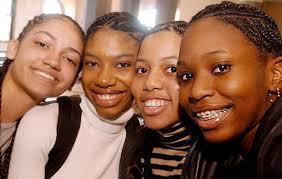 This morning I gave a talk in a middle school auditorium full of two hundred 6th graders! They were a very diverse, very well-behaved group and I was struck by the range of students that came up to me after the talk. My presentation is usually interactive but that’s hard to do with such a large group. I told the students, in French, that I was from Canada and one white boy came up to me afterward and said, “Je parle français aussi!” “Really? D’où viens-tu?” I asked him, and he told me about his French mother and his German father. Another white boy bought a copy of Ship of Souls, had me sign it, and then came back to tell me that he was so excited when he learned I was coming to school today because it’s his birthday. But what struck me most were the Black girls—the way they circled me and stayed close, asking questions, then drifting away, and then coming back to tell me something else. Two Asian girls wanted to take a picture with me and had to elbow their way into the pack. A young woman wearing hijab came in before my presentation and told me how excited she was to meet an author. I complimented her on her sparkly glasses and she said, “They need to see us wearing glasses! They need to know that we read!” Later she returned and pulled out her phone so we could take a picture. Almost all the kids had smart phones! Hand-me-downs from their parents, I guess. I brought 6 books to sell but the principal decided to buy the books from me and hold a raffle on the spot instead. It’s wonderful to see two hundred kids wriggling in their seats, anxiously waiting to hear their name called. When I got home I turned on NPR and Neil deGrasse Tyson was talking about the Andromeda galaxy and how it’s being drawn toward our own. That’s how I felt with those girls circling me—it was like there was some kind of force drawing us together. I say over and over that my books are for all kids, and it means a lot to me when kids of other races express enthusiasm about my work. But I know that my presence means something special to Black girls. One 6th grader stuck to me like glue and one of the first things she said was, “Thank you for making a book with girls who look like us.”
This morning I gave a talk in a middle school auditorium full of two hundred 6th graders! They were a very diverse, very well-behaved group and I was struck by the range of students that came up to me after the talk. My presentation is usually interactive but that’s hard to do with such a large group. I told the students, in French, that I was from Canada and one white boy came up to me afterward and said, “Je parle français aussi!” “Really? D’où viens-tu?” I asked him, and he told me about his French mother and his German father. Another white boy bought a copy of Ship of Souls, had me sign it, and then came back to tell me that he was so excited when he learned I was coming to school today because it’s his birthday. But what struck me most were the Black girls—the way they circled me and stayed close, asking questions, then drifting away, and then coming back to tell me something else. Two Asian girls wanted to take a picture with me and had to elbow their way into the pack. A young woman wearing hijab came in before my presentation and told me how excited she was to meet an author. I complimented her on her sparkly glasses and she said, “They need to see us wearing glasses! They need to know that we read!” Later she returned and pulled out her phone so we could take a picture. Almost all the kids had smart phones! Hand-me-downs from their parents, I guess. I brought 6 books to sell but the principal decided to buy the books from me and hold a raffle on the spot instead. It’s wonderful to see two hundred kids wriggling in their seats, anxiously waiting to hear their name called. When I got home I turned on NPR and Neil deGrasse Tyson was talking about the Andromeda galaxy and how it’s being drawn toward our own. That’s how I felt with those girls circling me—it was like there was some kind of force drawing us together. I say over and over that my books are for all kids, and it means a lot to me when kids of other races express enthusiasm about my work. But I know that my presence means something special to Black girls. One 6th grader stuck to me like glue and one of the first things she said was, “Thank you for making a book with girls who look like us.”
I need to come up with a business model that will enable me to sell more books at more schools. For the past few years I’ve earned more from honoraria than I have from royalties. I wonder if I could flip that by doing free author talks at schools that can guarantee the sale of at least 50 books. Giving out order forms before my visit doesn’t work because the kids don’t get excited about the books until I’m there giving my presentation. And then they don’t have money to buy books. At this particular school the librarian is handing out more order forms; we’ll see how many kids can sustain their excitement long enough to complete a purchase…


March 5, 2014
eat, write, submit!
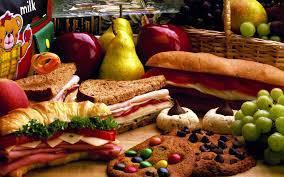 CALL FOR SUBMISSIONS: Children’s Poetry Anthology on Food and Agriculture
CALL FOR SUBMISSIONS: Children’s Poetry Anthology on Food and AgricultureSubmission Deadline: June 14th, 2014
An independently published anthology of children’s poetry dedicated to the theme of food and agriculture is in the works. Adults who write children’s poetry, including those who are emerging poets, are invited to submit their work. I am looking for original, unpublished poems, written in English, aimed at 8- to 12-year-olds that deal with various aspects of food and agriculture such as (but not limited to):
*food deserts
*edible landscapes
*food banks
*vertical gardens (also known as living walls, biowalls, ecowalls, green walls)
*children’s food assistance programs
*gardening (ie. family gardening, school gardens, rooftop gardens, community gardens, balcony/container gardening, window boxes)
*types of farming (ie. rural, urban, organic, sustainable)
*farmer’s markets / public markets
*fair trade food
*100-mile diet
*vegetarianism/ veganism
and any other sub-topics you can think of!
I am interested in receiving poems written in a variety of forms including but not limited to the following forms: couplet, triplet, limerick, haiku, tanka, cinquain, diamante, mask poem, apostrophe poem, list poem, etheree, palindrome, etc.
Poets whose work is selected for the collection will be contacted shortly after the deadline. They will also receive a small one-time honorarium.
Please email poems to Carol-Ann Hoyte at kidlitfan1972 at yahoo dot ca.


March 2, 2014
rasanblaj
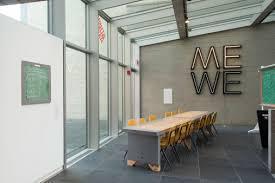 I teach on the weekend but yesterday I needed a mental health day. On Friday I was thrilled to sit down with 7 other black women artists/scholars to talk about the richness and challenge of our hybrid lives in an affirming way. The rasanblaj, “defined as assembly, compilation, enlisting, regrouping, (of ideas, things, people, spirits),” was coordinated by Gina Athena Ulysse, a performance artist/scholar I met in Ghana last spring. Gina invited us “to symbolically break bread in the spirit of rasanblaj,” reminding us that, for Blacks in the Americas, “once upon a time gathering was a profound act of opposition and resistance.” We met at the Studio Museum of Harlem and sat at the table (above) installed by Theaster Gates; Glenn Ligon‘s illuminated artwork hung on the wall behind us and Nina Simone‘s voice drowned us out every few minutes, a song of hers I couldn’t name playing on a loop. At the table were playwrights, actors, performance artists, a sculptor, a poet, a figure skater (!), and a novelist. Some of us were old friends and some of us had never met before yet it didn’t take much for the words to flow. Something happens when people gather around a table. I hate mingling but I love dinner parties—it’s so much easier to get to know someone when you’re seated across from one another. There’s something automatically equitable about a table, especially when no one’s sitting “at the head.” You’re aware of who’s talking and who’s not, how each person is reacting to what’s being said. And for the most part, no one was checking her phone…We talked for two hours and then bundled up and walked over to The Cecil to continue the conversation. I didn’t end the night with an answer to my question: “Does art benefit or suffer from security?” But at least I left knowing that others are grappling with this question, too. Become an expatriate or never leave NYC? Stay in the academy or hustle to make art that sells? Go along to get along or put out-of-line people back in their place? We do it all, it seems. It’s rarely either/or. So I will finish this article for a UK website and then finish up my grading…
I teach on the weekend but yesterday I needed a mental health day. On Friday I was thrilled to sit down with 7 other black women artists/scholars to talk about the richness and challenge of our hybrid lives in an affirming way. The rasanblaj, “defined as assembly, compilation, enlisting, regrouping, (of ideas, things, people, spirits),” was coordinated by Gina Athena Ulysse, a performance artist/scholar I met in Ghana last spring. Gina invited us “to symbolically break bread in the spirit of rasanblaj,” reminding us that, for Blacks in the Americas, “once upon a time gathering was a profound act of opposition and resistance.” We met at the Studio Museum of Harlem and sat at the table (above) installed by Theaster Gates; Glenn Ligon‘s illuminated artwork hung on the wall behind us and Nina Simone‘s voice drowned us out every few minutes, a song of hers I couldn’t name playing on a loop. At the table were playwrights, actors, performance artists, a sculptor, a poet, a figure skater (!), and a novelist. Some of us were old friends and some of us had never met before yet it didn’t take much for the words to flow. Something happens when people gather around a table. I hate mingling but I love dinner parties—it’s so much easier to get to know someone when you’re seated across from one another. There’s something automatically equitable about a table, especially when no one’s sitting “at the head.” You’re aware of who’s talking and who’s not, how each person is reacting to what’s being said. And for the most part, no one was checking her phone…We talked for two hours and then bundled up and walked over to The Cecil to continue the conversation. I didn’t end the night with an answer to my question: “Does art benefit or suffer from security?” But at least I left knowing that others are grappling with this question, too. Become an expatriate or never leave NYC? Stay in the academy or hustle to make art that sells? Go along to get along or put out-of-line people back in their place? We do it all, it seems. It’s rarely either/or. So I will finish this article for a UK website and then finish up my grading…


February 25, 2014
everyday people
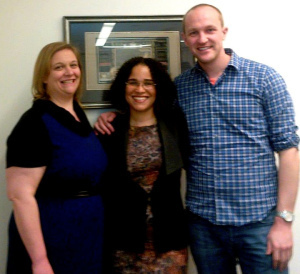 It’s done! The talk at Harvard has been hanging over my head for such a long time and I’m very relieved that it’s finally behind me. To my surprise, I wasn’t nervous at all. It helped that the talk was held in a large classroom; the desks were arranged in a square and my two cousins, Laura and Nathan, sat to my right and our gracious host for the evening (a graduate student and young adult novelist!) sat to my left. We started out with only three other people but finished with about a dozen; my talk was well received and the Q&A sparked an interesting conversation that lasted throughout dinner at the Faculty Club. Apparently the Canada Seminar attracts a mix of professors, students, and community members and last night was no exception. I’d been worried about having to deal with pretentious elites but everyone was down to earth and truly interested in learning about Canada. That’s a rare experience and since it’s hard for me to find an audience in Canada, it was a real treat to have such a frank conversation. The whole trip was memorable—my cousin Laura came all the way from Toronto to hear my talk and hers was the first face I saw when I got off the train in Boston. Her brother Nathan works in Boston and his girlfriend Beth took us to an Italian restaurant for a delicious meal. We finished with gelato and a brief, chilly walking tour that included Paul Revere’s house! My talk was partly about how the failure of the family inspires great writing, but I was *very* grateful for my cousins’ presence this weekend. I also met Linda (below) who said she found my talk inspiring but she impressed me with her determination to study at Harvard! She left her home in Texas to relocate to Massachusetts, and was supposed to go see another campus event with Herbie Hancock but stopped by the Weatherhead Center instead. I didn’t get to see Jamaica Kincaid but I did leave a bundle of books for her. I met an entrepreneur, Dianne, who is a Brooklyn Tech grad—and that’s where I’ll be heading tomorrow for an afternoon school visit. The weather has turned—again—and we’re expecting snow tomorrow. I’ve got papers to grade and one more article to send off, but I’m going to ride this high as long as I can! Thank goodness for everyday people…
It’s done! The talk at Harvard has been hanging over my head for such a long time and I’m very relieved that it’s finally behind me. To my surprise, I wasn’t nervous at all. It helped that the talk was held in a large classroom; the desks were arranged in a square and my two cousins, Laura and Nathan, sat to my right and our gracious host for the evening (a graduate student and young adult novelist!) sat to my left. We started out with only three other people but finished with about a dozen; my talk was well received and the Q&A sparked an interesting conversation that lasted throughout dinner at the Faculty Club. Apparently the Canada Seminar attracts a mix of professors, students, and community members and last night was no exception. I’d been worried about having to deal with pretentious elites but everyone was down to earth and truly interested in learning about Canada. That’s a rare experience and since it’s hard for me to find an audience in Canada, it was a real treat to have such a frank conversation. The whole trip was memorable—my cousin Laura came all the way from Toronto to hear my talk and hers was the first face I saw when I got off the train in Boston. Her brother Nathan works in Boston and his girlfriend Beth took us to an Italian restaurant for a delicious meal. We finished with gelato and a brief, chilly walking tour that included Paul Revere’s house! My talk was partly about how the failure of the family inspires great writing, but I was *very* grateful for my cousins’ presence this weekend. I also met Linda (below) who said she found my talk inspiring but she impressed me with her determination to study at Harvard! She left her home in Texas to relocate to Massachusetts, and was supposed to go see another campus event with Herbie Hancock but stopped by the Weatherhead Center instead. I didn’t get to see Jamaica Kincaid but I did leave a bundle of books for her. I met an entrepreneur, Dianne, who is a Brooklyn Tech grad—and that’s where I’ll be heading tomorrow for an afternoon school visit. The weather has turned—again—and we’re expecting snow tomorrow. I’ve got papers to grade and one more article to send off, but I’m going to ride this high as long as I can! Thank goodness for everyday people…


February 21, 2014
Discussing the Diversity Gap on The Debrief with David Ushery
 I had a surreal experience today: I went to WNBC’s studio and saw the newscasters I watch every day in action! I was nervous—TV isn’t made for introverts!—but everyone in the studio was very kind and I relaxed after a while. Last fall I sent my books and some diversity articles to several media personalities, hoping they’d be willing to start a public conversation about the need for change. Basir Mchawi at WBAI and David Ushery at WNBC are the only two who responded, and I’m very grateful that they let me share my views on race and publishing. The Debrief with David Ushery airs on Sunday mornings at 5:30 am but if you’re not a morning person, you can watch my segment on “the diversity gap” here.
I had a surreal experience today: I went to WNBC’s studio and saw the newscasters I watch every day in action! I was nervous—TV isn’t made for introverts!—but everyone in the studio was very kind and I relaxed after a while. Last fall I sent my books and some diversity articles to several media personalities, hoping they’d be willing to start a public conversation about the need for change. Basir Mchawi at WBAI and David Ushery at WNBC are the only two who responded, and I’m very grateful that they let me share my views on race and publishing. The Debrief with David Ushery airs on Sunday mornings at 5:30 am but if you’re not a morning person, you can watch my segment on “the diversity gap” here.


February 16, 2014
kind of blue
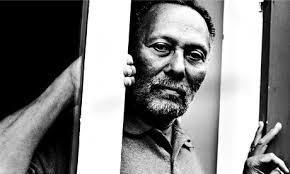 Stuart Hall died last week and since hearing the news I’ve been feeling weary and blue. Last night I had a dream about my father; he was puttering around in the basement and I think I was trying to help him build something. He was ten years younger than Stuart Hall—and died ten years sooner—but both men left the Caribbean in search of something more. Both stayed abroad, married white women, and had two daughters. I don’t think I was able to understand myself and my difficult relationship with my father until I read the work of Stuart Hall. All week I’ve tried and failed to write about that particular moment in my life. So last night, after reading an interview Hall gave in 1992, I put on some melancholy music (Adele’s “Hometown Glory”) and waited for the words to flow. But they’re still stuck. I could have met Stuart Hall back in 2008 or 2009. I was at a conference (either London or Paris) and folks began to whisper that Stuart Hall had arrived. I turned and saw him surrounded by a tight circle of colleagues; he had a cane and seemed rather frail but I could have reached out and touched his arm. I could have told him how much his essay, “Minimal Selves,” meant to me, how I discovered it just as I decided to leave graduate school and pursue my dream of becoming a novelist. This week if I had Stuart Hall within reach I would probably blurt out, “I love you!” Which wouldn’t be untrue, though it may seem unlikely and certainly inappropriate in an academic context. But I am not an academic and have no shame admitting that some texts—some voices—have spoken to me at just the right moment. Just when I felt certain that graduate school had been an utter waste of time, I took a seminar with Tricia Rose, read two essays by Stuart Hall, and wrote an essay in a voice that I truly recognized as my own. And I was able to do that because Stuart Hall modeled a kind of honesty in his own work that was both startling and liberating:
Stuart Hall died last week and since hearing the news I’ve been feeling weary and blue. Last night I had a dream about my father; he was puttering around in the basement and I think I was trying to help him build something. He was ten years younger than Stuart Hall—and died ten years sooner—but both men left the Caribbean in search of something more. Both stayed abroad, married white women, and had two daughters. I don’t think I was able to understand myself and my difficult relationship with my father until I read the work of Stuart Hall. All week I’ve tried and failed to write about that particular moment in my life. So last night, after reading an interview Hall gave in 1992, I put on some melancholy music (Adele’s “Hometown Glory”) and waited for the words to flow. But they’re still stuck. I could have met Stuart Hall back in 2008 or 2009. I was at a conference (either London or Paris) and folks began to whisper that Stuart Hall had arrived. I turned and saw him surrounded by a tight circle of colleagues; he had a cane and seemed rather frail but I could have reached out and touched his arm. I could have told him how much his essay, “Minimal Selves,” meant to me, how I discovered it just as I decided to leave graduate school and pursue my dream of becoming a novelist. This week if I had Stuart Hall within reach I would probably blurt out, “I love you!” Which wouldn’t be untrue, though it may seem unlikely and certainly inappropriate in an academic context. But I am not an academic and have no shame admitting that some texts—some voices—have spoken to me at just the right moment. Just when I felt certain that graduate school had been an utter waste of time, I took a seminar with Tricia Rose, read two essays by Stuart Hall, and wrote an essay in a voice that I truly recognized as my own. And I was able to do that because Stuart Hall modeled a kind of honesty in his own work that was both startling and liberating:
Migration is a one-way trip. There is no ‘home’ to go back to. There never was…The truth is, I am here because it’s where my family is not. I really came here to get away from my mother. Isn’t that the universal story of life? One is where one is to try and get away from somewhere else. That was the story which I could never tell anybody about myself. So I had to find other stories, other fictions, which were more authentic or, at any rate, more acceptable, in place of the Big Story of the endless evasion of patriarchal family life. Who I am—the ‘real’ me—was formed in relation to a whole set of other narratives. I was aware of the fact that identity is an invention from the very beginning, long before I understood any of this theoretically.
I’m giving a talk about Canada at Harvard next week and I’m sure there won’t be more than half a dozen people in the room. My host let me know that even he won’t be in attendance but I want to do a good job nonetheless. Jamaica Kincaid teaches in the English Department there and part of me wants to email her and ask her to attend. Like Hall, her books also found me when I needed them most. And yes, it might be awkward to stand at a podium and say, “Once I was drowning and your words kept me afloat.” But shouldn’t an author know how their words operate in the world—the good that they do? Did Stuart Hall know that tremendous impact he had not only on the field of cultural studies but also on individuals outside of academia? I hope so.


February 14, 2014
Black women create comics, too!
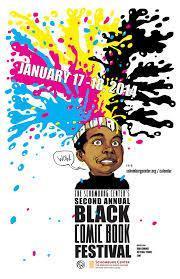 Last month I attended the Black Comic Book Festival at the Schomburg. I only went to one panel but it was worth the trip to Harlem because that’s how I first learned about the work of Juliana “Jewels” Smith, creator of (H)afrocentric. Jewels kindly agreed to answer some questions for me; since my last post (“Do Comics Empower Black Girls?“) I’ve had a few conversations with black women creators and scholars that give me hope about the field. Qiana Whitted is compiling a list of great comics for girls and I’ve started my own collection of black feminist comics. If we want to see different images and stories, we’ve got to support the creators who are trying to make it happen!
Last month I attended the Black Comic Book Festival at the Schomburg. I only went to one panel but it was worth the trip to Harlem because that’s how I first learned about the work of Juliana “Jewels” Smith, creator of (H)afrocentric. Jewels kindly agreed to answer some questions for me; since my last post (“Do Comics Empower Black Girls?“) I’ve had a few conversations with black women creators and scholars that give me hope about the field. Qiana Whitted is compiling a list of great comics for girls and I’ve started my own collection of black feminist comics. If we want to see different images and stories, we’ve got to support the creators who are trying to make it happen!
1. How can comics empower Black girls? Conventional representations of women in comics seem to reinforce the worst stereotypes of patriarchal society. Can unconventional representations of men and women really transform our understanding of race and gender (& class & sexuality)?
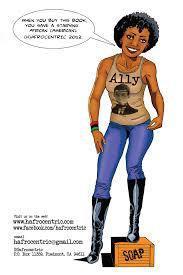 Comics, like any form of media or art, have the ability to change the way we see reality. If all you see as a reader and consumer of culture is women as sexual objects with limited AGENCY/POWER, then you may think that is the way the world is and should be. Conversely, you may see strong women characters that have a physical prowess (often seen as a masculine quality) but are redeemed through their sexuality, particularly heterosexuality. God forbid you have a strong character that is a lesbian or bisexual too! Aaaahhh!
Comics, like any form of media or art, have the ability to change the way we see reality. If all you see as a reader and consumer of culture is women as sexual objects with limited AGENCY/POWER, then you may think that is the way the world is and should be. Conversely, you may see strong women characters that have a physical prowess (often seen as a masculine quality) but are redeemed through their sexuality, particularly heterosexuality. God forbid you have a strong character that is a lesbian or bisexual too! Aaaahhh!
But, if you read a heaping amount of strong women getting on soapboxes, leading movements, kicking ass, and also being vulnerable, we can begin to see representation that is both complicated and nuanced, like all of us. And that is what I hope to do as a writer and storyteller. I think the best thing we can do as writers and storytellers is continue to try and nuance characters (representations of blackness and gender) and tell stories that may alter the way we see the world.
2. As an educator, I’m troubled by my students’ attitude toward literature; most don’t read recreationally and therefore struggle with assigned readings for class. I’ve resisted appeals to pen a graphic novel, though I appreciate the broad appeal of comics and the importance of visual literacy. As a writer, why did you choose to tell stories this way?
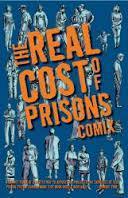 I started precisely for this reason.
When I was teaching at Laney College in Oakland, I was experimenting with comic books as a way to introduce really complicated concepts like the prison industrial complex to my students. I gave my students the
Real Costs of Prisons Comix
and they really enjoyed it. So much so that I had a student in my class said she had given the comic book to her grandmother to read. I was floored. I thought to myself, comics are a really powerful medium that I should explore. I was already a huge fan of The Boondocks and using that in class as well.
I started precisely for this reason.
When I was teaching at Laney College in Oakland, I was experimenting with comic books as a way to introduce really complicated concepts like the prison industrial complex to my students. I gave my students the
Real Costs of Prisons Comix
and they really enjoyed it. So much so that I had a student in my class said she had given the comic book to her grandmother to read. I was floored. I thought to myself, comics are a really powerful medium that I should explore. I was already a huge fan of The Boondocks and using that in class as well. 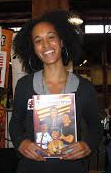
Later, I started writing (H)afrocentric in response to my work life, being a young educator in Community Colleges, my family life; musing on the relationship between my brother and I, my hometown, and my current life in Oakland.
3. Can you recommend a few artists and/or titles that have a progressive and/or unconventional approach to representing women and men in comics?
I really like Qahera, a story about a Muslim woman superhero who kicks the ass of misogynist men and white savior complex feminists. How can you be mad at that? Sounds like a match made in heaven.
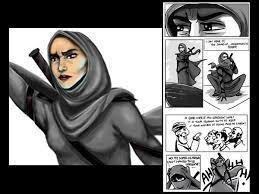 Also, buy my comic book!!! It’s funny and instead of saving Africans by adopting them, you can save an African American artist.
Also, buy my comic book!!! It’s funny and instead of saving Africans by adopting them, you can save an African American artist.
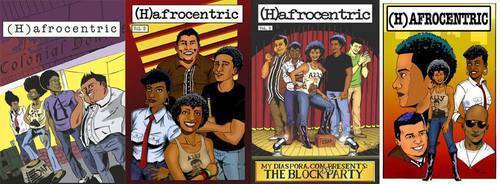 Juliana “Jewels” Smith is a cultural worker, educator, writer and organizer. She earned her B.A. in Sociology from UC Riverside and M.A. in Ethnic Studies at UC San Diego. As an educator in community colleges Smith decided she could reach more of her students through an unorthodox medium, a comic book. She created (H)afrocentric as a way to challenge students and readers alike about the presumptions around race, class, gender and sexuality through character dialogue. Her practice focuses on the links between racial justice, gender equity, and political literacy; using creativity to facilitate dialogue. Follow her on Twitter (@hafrocentric) and on Facebook.
Juliana “Jewels” Smith is a cultural worker, educator, writer and organizer. She earned her B.A. in Sociology from UC Riverside and M.A. in Ethnic Studies at UC San Diego. As an educator in community colleges Smith decided she could reach more of her students through an unorthodox medium, a comic book. She created (H)afrocentric as a way to challenge students and readers alike about the presumptions around race, class, gender and sexuality through character dialogue. Her practice focuses on the links between racial justice, gender equity, and political literacy; using creativity to facilitate dialogue. Follow her on Twitter (@hafrocentric) and on Facebook.



